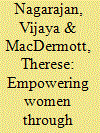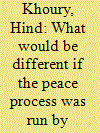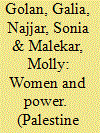| Srl | Item |
| 1 |
ID:
128529


|
|
|
|
|
| Publication |
2013.
|
| Summary/Abstract |
Although the pluralist system of land tenure in Vanuatu does not directly discriminate against women, the operation of the system and contemporary interpretations of custom is increasingly marginalising women from the decision making processes regarding land management and control. Commitment to the principles of gender equality through constitutional guarantees and the ratification of relevant international treaty obligations, while providing a relevant legal framework for equality, have only had limited success in addressing discriminatory practices. This article analyses alternative ways to overcome the barriers faced by women that are currently under consideration in many Pacific island Countries, including recording and registration, as well as legal vehicles such as incorporating customary land groups, trusts and community companies. This article concludes that while both existing and proposed mechanisms have the potential to secure for women a greater role in decision making processes regarding land management and control, that potential will not be realised in the absence of knowledge, empowerment and the acceptance of the legitimacy of such rights
|
|
|
|
|
|
|
|
|
|
|
|
|
|
|
|
| 2 |
ID:
130500


|
|
|
|
|
| Publication |
2011.
|
| Summary/Abstract |
Upon first reflecting on the topic under discussion - "What would be different if the peace process was run by women" - I thought it to be an indirect expression of a deep frustration with the peace process. Many observers and stakeholders worldwide realize that if the process is not entirely dead, it is undoubtedly breathing its last breath.
|
|
|
|
|
|
|
|
|
|
|
|
|
|
|
|
| 3 |
ID:
130516


|
|
|
|
|
| Publication |
2011.
|
| Summary/Abstract |
Golan: I think we all agree that we need to find ways that women can be more power full, and this can be anywhere from economic freedom in the household all the way up to participation in decision-making. The question is: What are the best ways to do this'? I think economic independence is one way in which women can begin to assert themselves and be able to at least stand on their own. not necessarily in terms of acting independently outside the home or on their own, but rather in terms of being able to be a full person. vis-a-\='is the other people within the household, whether a husband or a brother or a Father. It begins there, and then we must look for ways to extend this so that women may have an actual role in decision-making. starting from the home and continuing all the way up to government.
Najjar: I would completely agree with you if this were under normal circumstances, perhaps under a real democracy. My concern is more in terms of wait has been happening in an environment of ongoing occupation and annexation. Whereas the household is a very important component. the largest component is that women are continuously living under a paradigm of oppression and lack any forms ourself determination, access, mobility, freedom of expression. identity or cultural activity. There is a little bit of leeway here and there, but I do not see how women can reach any type
|
|
|
|
|
|
|
|
|
|
|
|
|
|
|
|